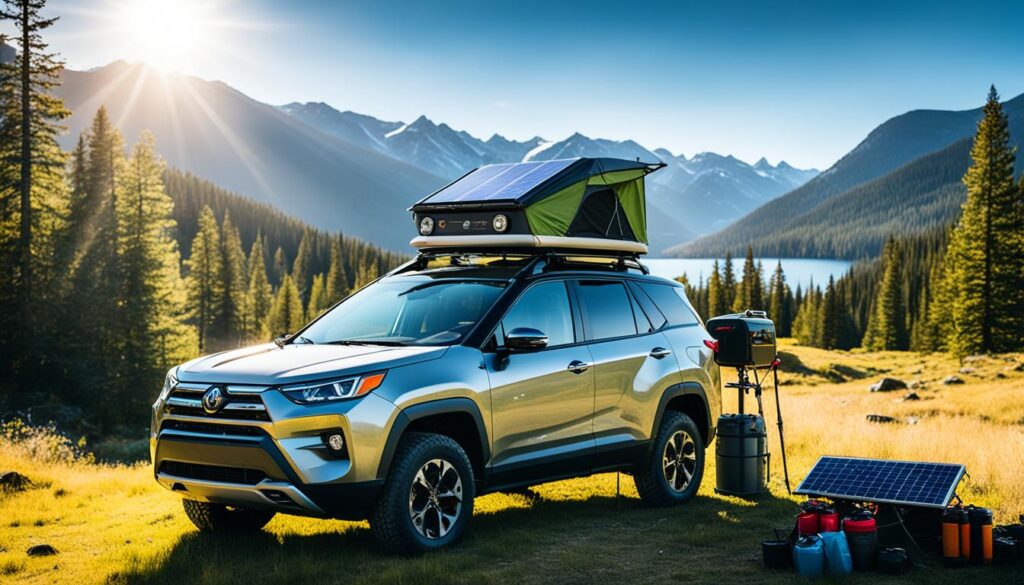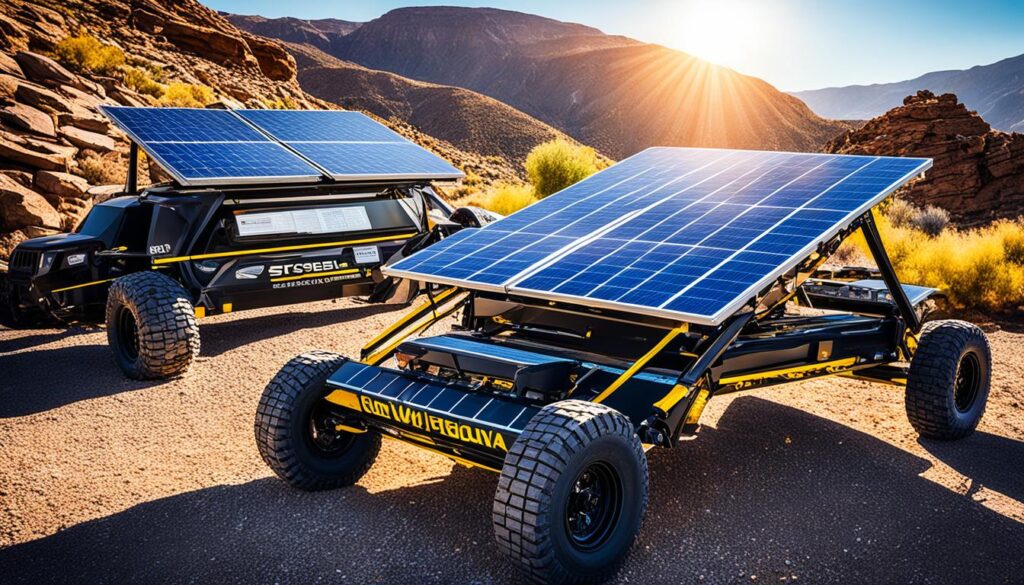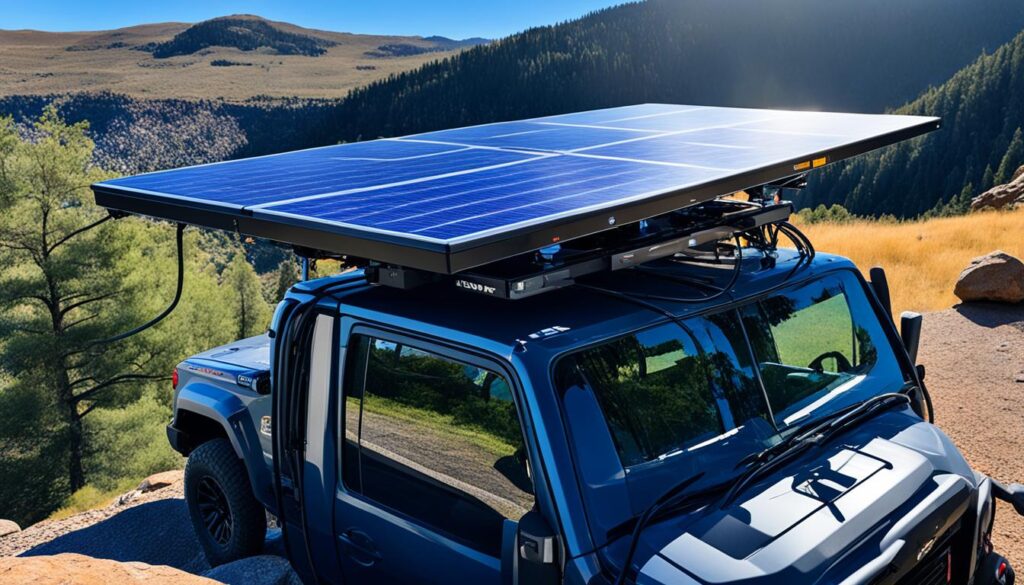Are you an adventurous soul who loves the thrill of overlanding? Imagine being able to embark on off-grid adventures, deep into nature, without worrying about access to electricity. With solar panels for overlanding, you can make this dream a reality. But why should you consider solar panels for your overlanding trips? What advantages do they offer? And how can they enhance your overall overlanding experience?
Overlanding solar panels are the answer to all your power needs while exploring remote locations. These panels harness the energy of the sun to provide you with a sustainable and cost-effective source of electricity. Say goodbye to reliance on fossil fuels and hello to energy independence!
In this article, I will take you through the key benefits of solar panels for overlanding. From maximizing energy efficiency to choosing the right solar panel setup, we will delve into everything you need to know to integrate solar panels into your overlanding adventures. So, let’s dive in and discover why solar panels are a game-changer for every overlander!
Key Takeaways:
- Overlanding solar panels provide a sustainable and cost-effective source of electricity for adventurous overlanders.
- They eliminate the need for fossil fuels and help minimize the environmental impact of your travels.
- Solar panels offer energy independence, allowing you to enjoy the comforts of home even in the most remote locations.
- Choosing the right solar panel setup is crucial for maximizing energy efficiency and meeting your power needs.
- Integrating solar panels into your overlanding setup can enhance your overall overlanding experience and make your adventures more enjoyable.
Overlanding solar panels are a game-changer for adventurous travelers who explore off the beaten path. Whether you’re embarking on a cross-country road trip or venturing into remote wilderness, having a reliable power source is crucial. That’s where overlanding solar panels come in. These specially designed solar panels are a must-have for anyone seeking energy independence and sustainability during their overlanding adventures.
So, what exactly are overlanding solar panels? Put simply, they are portable and lightweight solar panels specifically built for off-grid travel. Unlike traditional solar panels, overlanding solar panels are foldable, allowing for easy storage and transportation. Their compact design makes them perfect for fitting into the limited space of an overlanding vehicle.
One of the key features of overlanding solar panels is their high-performance solar cells. These cells, typically made from monocrystalline or polycrystalline silicon, ensure maximum efficiency and power conversion. This means you can generate more electricity from the sun, even in challenging environments.
Overlanding solar panels are designed to withstand the rough conditions encountered during off-road adventures. They are built with durability in mind, with rugged materials and reinforced frames that can handle bumps, vibrations, and exposure to the elements. Whether you’re driving through rocky terrain or camping in extreme weather, your overlanding solar panels will keep providing you with a reliable and sustainable power source.
Why are overlanding solar panels so important for the avid adventurer? The benefits are numerous. By harnessing the power of the sun, overlanding solar panels offer a range of advantages that enhance your outdoor experience:
- Energy Independence: Overlanding solar panels free you from relying on traditional power sources. You can charge your devices, run appliances, and light up your campsite without the need for grid connections or noisy generators. With solar panels, you can explore with peace of mind, knowing you have a reliable power source at your disposal.
- Sustainability: Overlanding solar panels are a sustainable alternative to traditional energy sources. By using the clean, renewable energy of the sun, you minimize your environmental impact and contribute to a greener future. Overlanders can enjoy their outdoor adventures while preserving the beauty of nature.
- Cost-Effectiveness: By investing in overlanding solar panels, you can save money in the long run. Once you’ve made the initial purchase, the energy from the sun is free. Say goodbye to expensive fuel costs and reliance on external power supplies.
- Versatility: Overlanding solar panels come in various sizes and configurations, allowing you to choose the setup that best fits your needs. Whether you require a panel to charge small devices or power a whole campsite, there are options available to suit every overlander.
When it comes to overlanding, having an efficient and reliable power source is a game-changer. Overlanding solar panels provide exactly that, allowing you to explore off-grid while maintaining the comforts and conveniences of home. With their portability, durability, and sustainable benefits, overlanding solar panels are an essential piece of equipment for any outdoor enthusiast.

Types of Overlanding Solar Panels
When it comes to overlanding solar panels, there are several types available to cater to different needs. Each type has its own unique characteristics and advantages. Let’s explore the most common types:
Monocrystalline Solar Panels
Monocrystalline solar panels are renowned for their high efficiency and sleek design. Made from a single silicon crystal, these panels offer excellent power conversion capabilities, allowing you to maximize energy output. Their efficiency makes them a popular choice among overlanders looking for optimal performance and aesthetics.
Polycrystalline Solar Panels
For those seeking a more cost-effective option, polycrystalline solar panels are a great choice. These panels are made from multiple silicon fragments melted together, offering good efficiency at a lower price point. Polycrystalline panels are durable and can withstand outdoor conditions, making them suitable for overlanding adventures.
Thin-Film Solar Panels
Thin-film solar panels are lightweight and flexible, making them highly versatile for overlanding setups. These panels utilize a thin semiconductor layer that is deposited on a flexible material, allowing them to conform to curved surfaces. While thin-film panels may have slightly lower efficiency compared to crystalline panels, their flexibility and portability make them ideal for space-limited or unconventional installations.
Comparison of Overlanding Solar Panel Types
| Type | Efficiency | Cost | Flexibility | Durability |
|---|---|---|---|---|
| Monocrystalline Solar Panels | High | Medium | Low | High |
| Polycrystalline Solar Panels | Medium | Low | Medium | High |
| Thin-Film Solar Panels | Low | Low | High | Medium |
Based on this comparison, overlanders can choose the type of solar panel that best suits their specific needs and preferences. Whether it’s prioritizing efficiency, cost-effectiveness, or flexibility, there is a solar panel type available to enhance your overlanding experience.

With a variety of types to choose from, overlanding solar panels provide a reliable and sustainable power source for your off-grid adventures. The next section will focus on selecting the right solar panel setup for your overlanding needs, ensuring you make the most of your solar energy investment.
Choosing the Right Solar Panel Setup for Overlanding
When it comes to overlanding, choosing the right solar panel setup is crucial for a smooth and efficient off-grid experience. There are several factors to consider when selecting overlanding solar panels, including solar panel capacity and output, battery options, charge controllers, and inverters.
Power Needs
The first step in choosing the right solar panel setup for overlanding is to assess your power needs. Consider the devices and appliances you will be powering during your adventures. Make a list of the wattage or power consumption of each device to determine the overall power requirement. This will help you calculate the size and number of solar panels needed to meet your energy needs.
Solar Panel Capacity and Output
When selecting overlanding solar panels, it’s important to consider their capacity and output. Solar panel capacity refers to the amount of power a solar panel can generate, usually measured in watts. Higher capacity panels can generate more power, which is beneficial if you have higher energy demands or limited sunlight. Additionally, consider the solar panel’s output voltage and current, as these factors determine the charging rate of your batteries.
Battery Options
Battery storage is an essential component of any overlanding solar panel setup. It allows you to store excess solar energy for use during cloudy or nighttime conditions. When choosing a battery for overlanding, consider its capacity, voltage compatibility with your solar panels and devices, and durability. Common battery options for overlanding include deep cycle batteries, lithium-ion batteries, and AGM batteries.
Charge Controllers and Inverters
Charge controllers and inverters play crucial roles in managing and converting solar energy. A charge controller regulates the charging process, preventing overcharging and maximizing battery life. Depending on your setup, you may need a PWM (Pulse Width Modulation) charge controller or an MPPT (Maximum Power Point Tracking) charge controller, which is more efficient for larger setups.
An inverter is necessary if you plan on using AC-powered devices during your overlanding adventures. It converts the DC power stored in your batteries into AC power for running appliances like laptops, refrigerators, or other household devices. Consider the inverter’s power rating and compatibility with your batteries and the devices you intend to use.
Once you have considered all these factors, you can make an informed decision and choose the right solar panel setup for your overlanding adventures. Remember, investing in high-quality solar panels, batteries, charge controllers, and inverters is essential to ensure reliable and efficient power generation during your off-grid travels.
Benefits of Solar Panels for Overlanding
Solar panels offer numerous advantages for overlanding adventures. The sustainability and eco-friendliness of solar panels make them a fantastic choice for overlanders who want to minimize their environmental impact and enjoy a more sustainable form of travel.
One of the key benefits of using solar panels for overlanding is their ability to provide energy independence. By harnessing the power of the sun, overlanders can generate their electricity and reduce their reliance on traditional power sources. This energy independence allows overlanders to explore remote locations without worrying about access to electricity.
Solar panels also offer noise-free operation, making them an excellent option for overlanders who value peace and tranquility in nature. Unlike traditional generators, solar panels operate silently, allowing overlanders to enjoy the sounds of nature without any disruptive noise.
Furthermore, the sustainability aspect of solar panels cannot be overstated. By utilizing solar energy, overlanders can significantly reduce their carbon footprint and contribute to a cleaner environment. Solar panels do not produce any greenhouse gas emissions or contribute to air or noise pollution, making them an eco-friendly choice for overlanding adventures.
If you’re looking for a sustainable and cost-effective power source for your overlanding endeavors, solar panels are the way to go. They provide clean, renewable energy without the harmful environmental effects of traditional power sources.
The benefits of solar panels for overlanding can be summarized as follows:
- Advantages of solar panels for overlanding: Solar panels offer energy independence and allow overlanders to generate their electricity.
- Benefits of using solar panels for overlanding: Solar panels provide noise-free operation and allow overlanders to enjoy the tranquility of nature.
- Sustainability and eco-friendliness of solar panels for overlanding: Solar panels are a sustainable and eco-friendly power source that helps reduce the environmental impact of overlanding.
- Noise-free operation of solar panels for overlanding: Solar panels operate silently, ensuring a peaceful overlanding experience without disruptive noise.
- Energy independence with solar panels for overlanding: Solar panels enable overlanders to be self-sufficient in terms of power, reducing reliance on traditional power sources.
By embracing solar panels for overlanding, adventurers can enjoy the benefits of clean, sustainable energy while exploring the great outdoors. Solar panels are a reliable and efficient power source that enhances the overlanding experience.
Conclusion
In conclusion, overlanding solar panels provide a revolutionary solution for travelers who seek off-grid adventures and self-sufficiency in energy. The numerous benefits of solar panels for overlanding, including sustainability, energy independence, cost-effectiveness, and noise-free operation, make them an invaluable asset for overlanders. By carefully selecting the appropriate solar panel setup for their journeys, overlanders can optimize energy efficiency, minimize their environmental impact, and significantly enhance their overall overlanding experience.
As solar technology continues to advance, overlanding solar panels have become more accessible, efficient, and reliable. Brands such as Renogy, Goal Zero, and Eco-Worthy offer a wide range of high-quality solar panel options specifically designed for overlanding. These portable and lightweight panels deliver exceptional performance, ensuring overlanders have a reliable power source wherever their adventures take them.
With their ability to harness the power of the sun, overlanding solar panels enable overlanders to enjoy the comforts of home while exploring remote and untouched landscapes. By embracing solar energy, overlanders can embark on sustainable and eco-friendly journeys, reducing their carbon footprint and preserving the natural beauty of the great outdoors. In conclusion, overlanding solar panels are a must-have for any avid overlander seeking a greener, more self-sufficient, and rewarding off-grid experience.
FAQ
Why should I use solar panels on my overlanding adventures?
Solar panels provide a sustainable and cost-effective power source for overlanders, allowing them to have access to electricity off the grid. Solar panels eliminate the need for fossil fuels and promote environmentally friendly travel.
What are overlanding solar panels?
Overlanding solar panels are specially designed solar panels that are portable, lightweight, and foldable. They are made with high-performance solar cells to ensure maximum efficiency and power conversion. Overlanding solar panels are built to withstand rugged outdoor conditions and are an essential part of an overlander’s equipment.
What types of overlanding solar panels are available?
There are several types of overlanding solar panels, including monocrystalline, polycrystalline, and thin-film panels. Monocrystalline panels are known for their high efficiency, polycrystalline panels offer a more cost-effective option, and thin-film panels are lightweight and flexible.
How do I choose the right solar panel setup for overlanding?
When choosing a solar panel setup for overlanding, consider your power needs, the devices and appliances you will be powering, and the size and number of solar panels required. Also, consider factors such as solar panel capacity, battery options, charge controllers, and inverters.
What are the benefits of solar panels for overlanding?
Solar panels provide numerous benefits for overlanding adventures. They offer sustainability, energy independence, cost-effectiveness, and noise-free operation. Solar panels allow overlanders to minimize their environmental impact and enhance their overall overlanding experience.
Any final thoughts on overlanding solar panels?
Overlanding solar panels have become an essential component for overlanders who want to travel off-grid and be self-sufficient in terms of energy. By harnessing the power of the sun, overlanders can enjoy sustainable travel while minimizing their environmental impact. Choosing the right solar panel setup will ensure maximum energy efficiency and enhance the overall overlanding experience.






